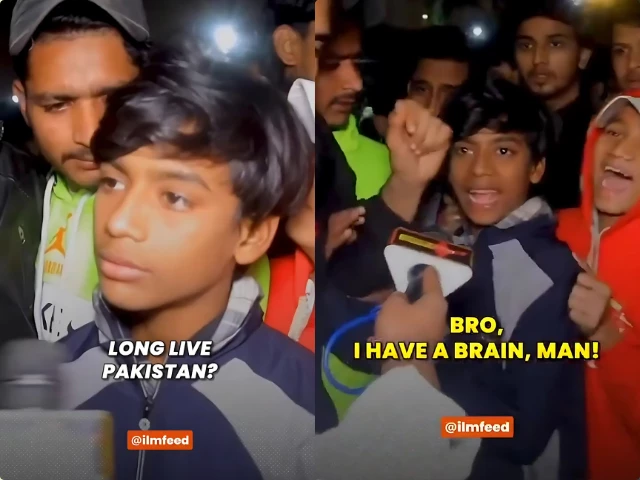WATCH: Indian teen shuts down war talk on camera
Teen Muhammad Kaif stuns reporter with anti-war clarity amid Pakistan-India tensions: “I have a brain.”

A walk-and-talk clip featuring a young boy from Bihar, Muhammad Kaif, is gaining traction online after he delivered a sharp anti-war response amid escalating tensions between Pakistan and India following recent military action.
The clip, viewed more than four million times, shows Kaif responding to a reporter’s question about whether he believed Pakistan should be destroyed.
“There are people there, and so too here. There are Muslims and there are Hindus, same as here. Everyone is human. Then why kill everyone?” he said.
The boy’s refusal to indulge in jingoism appeared to rattle the reporter, who questioned whether Kaif felt ashamed for not denouncing Pakistan.
Unmoved, Kaif fired back, criticising the divisiveness in “Hindu-Muslim news” and challenging the line of questioning.
When pressed further on who had taught him his views, he replied, “Taught? I have a brain.”
The interview occurred in the wake of India’s airstrikes in Pakistan.
The incident has heightened military tensions and polarised public discourse, with both social media and mainstream outlets featuring sharp rhetoric on both sides of the border.
The boy’s remarks have drawn attention from a wide spectrum of social media users, many of whom have praised the clarity of his position.
He's doing everything to identify this little boy, asking nonsense questions and saying, « Who taught you this? » as if someone has to be taught how to be human and show humanity. May God protect this child.
— Mo Djamil 🇸🇳 (@MoDjamil) May 8, 2025
Smart boy, reporter should be ashamed of himself
— Kayla (@kaylapop_) May 8, 2025
Perfect example of how the media does things to make us hate each other.
— Vizionary Trading (@VizionaryTrding) May 8, 2025
This kid is intelligent. The journalist is a terror agent.
— Hassan (@Theehardtruth) May 8, 2025
The clip continues to circulate widely as part of broader online reactions to the ongoing conflict.
Latest tensions
The latest escalation in tensions between India and Pakistan follows the April 22 attack in Pahalgam, Indian Illegally Occupied Jammu and Kashmir (IIOJK), which resulted in 26 fatalities. India immediately accused Pakistan-based elements of orchestrating the attack, although no evidence was provided. Islamabad has strongly rejected these allegations.
In retaliation, India closed the Wagah land border on April 23, suspended the Indus Waters Treaty, and revoked Pakistani visas. Pakistan responded by labeling any disruption to water flow as an "act of war" and closed the Wagah crossing on its side.
The situation escalated further on Wednesday, as reports from various cities in Pakistan, including Muzaffarabad, Kotli, Muridke, and Bahawalpur, detailed multiple explosions. Pakistan’s military spokesperson, Lt Gen Ahmed Sharif Chaudhry, confirmed that Indian airstrikes had targeted multiple locations within Pakistan. In response, Pakistan launched swift air and ground operations.
Within the first hour of retaliation, Pakistan announced the downing of five Indian fighter jets, including four Rafale aircraft, which India had recently acquired from France to strengthen its air defenses following the failed Balakot operation in 2019.
"Pakistan could have shot down 10 Indian fighter jets," Lt Gen Chaudhry said during a press briefing. "But Pakistan chose to exercise restraint."
Despite the scale of the response, Indian media remained largely silent on the losses. The Hindu, a prominent Indian newspaper, initially reported that three Indian jets had been downed but later removed the article, likely under pressure from the Indian government to avoid further embarrassment.
An American commentator on CNN stated that the potential loss of Rafale jets would severely damage India’s claim to air superiority, which it had built around the induction of these advanced French warplanes. Some experts speculated that the confrontation served as a test of Chinese and Western military technologies, particularly after Pakistan acquired J-10C jets from China in response to India’s Rafale fleet.
A senior French intelligence official confirmed to CNN that one Rafale jet had indeed been shot down by Pakistan, marking the first time that this sophisticated French aircraft had been lost in combat.
In another development, the Pakistan armed forces confirmed the neutralization of 25 Israeli-made Harop drones used by India in recent cross-border activity.
A statement issued by Pakistan's Inter-Services Public Relations (ISPR) on Thursday confirmed that these drones were shot down using both electronic countermeasures (soft-kill techniques) and conventional weaponry (hard-kill systems) after they were detected flying over multiple areas across Pakistan.
The ISPR described the drone incursions as a "desperate and panicked response" by India, which came after Pakistan’s retaliatory operations on May 6 and 7, in which five Indian fighter jets were downed and several military posts were struck.
Unfazed by the Israeli-made armed drones, called "loitering munitions", sent by India over multiple cities of Pakistan, including Karachi, residents of the metropolitan city poured onto the streets in an extraordinary wave of solidarity with the armed forces.
The number of Indian drones downed by Pakistani armed forces had reached at least 77, security sources confirmed on Friday.









1644560129-0/download-(20)1644560129-0-208x130.webp)













COMMENTS
Comments are moderated and generally will be posted if they are on-topic and not abusive.
For more information, please see our Comments FAQ